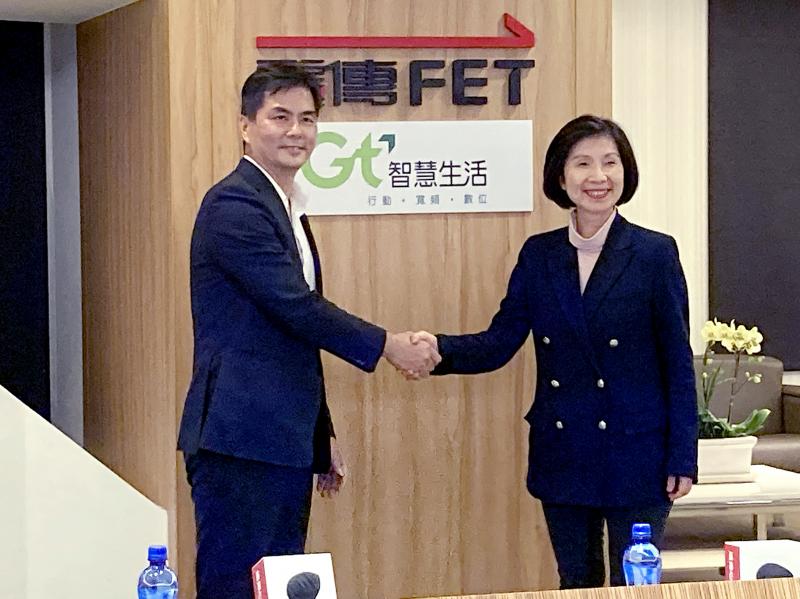Far EasTone Telecommunications Co (遠傳電信) yesterday said it is to merge with Asia Pacific Telecom Co (亞太電信) in a share swap worth about NT$24.7 billion (US$881.48 million), which would be the latest consolidation in Taiwan’s telecom industry.
Based on the statement, each share of Asia Pacific Telecom would be swapped for 0.093 Far EasTone shares.
The deal is expected to be completed on Sept. 30.

Photo: Lisa Wang, Taipei Times
The announcement follows a plan by Taiwan Mobile Co (台灣大哥大) to acquire smaller peer Taiwan Star Telecom Corp (台灣之星) for NT$28.2 billion.
Originally, Far EasTone had planned to increase its stake in Asia Pacific to 23.8 percent this year based on an agreement the two firms signed two years ago.
Far EasTone has an 11.58 percent stake in Asia Pacific.
“However, after our peers announced their merger plan in December last year, we thought our strategy should evolve with the changes in the market and the industry landscape,” Far EasTone president Chee Ching (井琪) told a news conference in Taipei.
Far EasTone expects to see synergy during the first year after the merger, as it would expand its 5G bandwidth and customer base.
Far EasTone would become the nation’s No. 2 telecom operator after the merger, with 9.2 million subscribers, surpassing Taiwan Mobile and Taiwan Star’s combined 9.12 million.
Far EasTone expects the health of the nation’s telecom industry to improve with the deals, as pricing competition would diminish with the reduction of operators to three from five, Ching said.
Hopefully with fewer players, bandwidth auctions would be less competitive, leading to reasonable bidding, she said.
Hon Hai Precision Industry Co (鴻海精密), which has a 36 percent stake in Asia Pacific, would hold 4 percent of Far EasTone after the transaction is completed.

Sweeping policy changes under US Secretary of Health and Human Services Robert F. Kennedy Jr are having a chilling effect on vaccine makers as anti-vaccine rhetoric has turned into concrete changes in inoculation schedules and recommendations, investors and executives said. The administration of US President Donald Trump has in the past year upended vaccine recommendations, with the country last month ending its longstanding guidance that all children receive inoculations against flu, hepatitis A and other diseases. The unprecedented changes have led to diminished vaccine usage, hurt the investment case for some biotechs, and created a drag that would likely dent revenues and

Global semiconductor stocks advanced yesterday, as comments by Nvidia Corp chief executive officer Jensen Huang (黃仁勳) at Davos, Switzerland, helped reinforce investor enthusiasm for artificial intelligence (AI). Samsung Electronics Co gained as much as 5 percent to an all-time high, helping drive South Korea’s benchmark KOSPI above 5,000 for the first time. That came after the Philadelphia Semiconductor Index rose more than 3 percent to a fresh record on Wednesday, with a boost from Nvidia. The gains came amid broad risk-on trade after US President Donald Trump withdrew his threat of tariffs on some European nations over backing for Greenland. Huang further

CULPRITS: Factors that affected the slip included falling global crude oil prices, wait-and-see consumer attitudes due to US tariffs and a different Lunar New Year holiday schedule Taiwan’s retail sales ended a nine-year growth streak last year, slipping 0.2 percent from a year earlier as uncertainty over US tariff policies affected demand for durable goods, data released on Friday by the Ministry of Economic Affairs showed. Last year’s retail sales totaled NT$4.84 trillion (US$153.27 billion), down about NT$9.5 billion, or 0.2 percent, from 2024. Despite the decline, the figure was still the second-highest annual sales total on record. Ministry statistics department deputy head Chen Yu-fang (陳玉芳) said sales of cars, motorcycles and related products, which accounted for 17.4 percent of total retail rales last year, fell NT$68.1 billion, or

MediaTek Inc (聯發科) shares yesterday notched their best two-day rally on record, as investors flock to the Taiwanese chip designer on excitement over its tie-up with Google. The Taipei-listed stock jumped 8.59 percent, capping a two-session surge of 19 percent and closing at a fresh all-time high of NT$1,770. That extended a two-month rally on growing awareness of MediaTek’s work on Google’s tensor processing units (TPUs), which are chips used in artificial intelligence (AI) applications. It also highlights how fund managers faced with single-stock limits on their holding of market titan Taiwan Semiconductor Manufacturing Co (TSMC, 台積電) are diversifying into other AI-related firms.